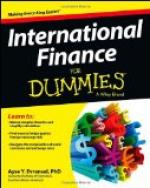In another sense it may be argued that war destroys capital in that it prevents its being accumulated, but this is a distortion of the meaning of the word destroy. If it had not been for the war, we in England should have been saving our usual three to four hundred millions a year and putting the money to productive uses, in so far as we did not lend it to spendthrift nations or throw it away on unprofitable ventures. If we had invested it well, it would have made us and the rest of the world richer. Instead of doing so we are spending our savings on war and consequently we are not growing richer. But when the war is over our material productive power will be as great as ever, except for the small number of our ships that have been sunk or the small amount of damage done to us by enemy aircraft. Our railways and factories may be somewhat behindhand in upkeep, but that will soon be made good, and against that item on the debit side, we may set the great new organization for munition works, part of which, we may hope, will be available for peaceful production when the time for peace is ripe.
It is a complete mistake to suppose that war can be carried on out of accumulated capital, which is thereby destroyed. All the things and services needed for war have to be produced as the war goes on. The warring nations start with a stock of ships and guns and military and naval stores, but the wastage of them can only be made good by the production of new stuff and new clothes and food for the soldiers and new services rendered as the war goes on. This new production may be done either by the warring powers or by neutrals, and if it is done by neutrals, the warring powers can pay for it out of capital by selling their securities or by pledging their wealth. In so far as this is done the warring powers impoverish themselves and the neutrals are enriched, but the world’s capital as a whole is not impaired. If we sell our Pennsylvania Railroad bonds to Americans, and buy shells with the proceeds, we are thereby poorer and Americans are richer, but the earning power of the Pennsylvania Railroad is not altered. It may be, if we conduct the war wastefully, and refuse to meet its cost by our own self-denial—going without things ourselves so that we can save, money to lend to the Government for the war—that we shall pledge our property and sell what of it we can sell to neutrals, to such an extent that we shall be seriously poorer at the end of it. At present[9] we are not selling and pledging our capital wealth any faster than we are lending to our Allies; and if we pull ourselves up short, and exercise the necessary self-denial, seeing that we must pay for the war in the long run out of our own pockets, and that far the cheapest and cleanest policy is to do so now, and if the war does not last too long, there is no reason why it should impoverish us to an extent that will cripple us seriously.




